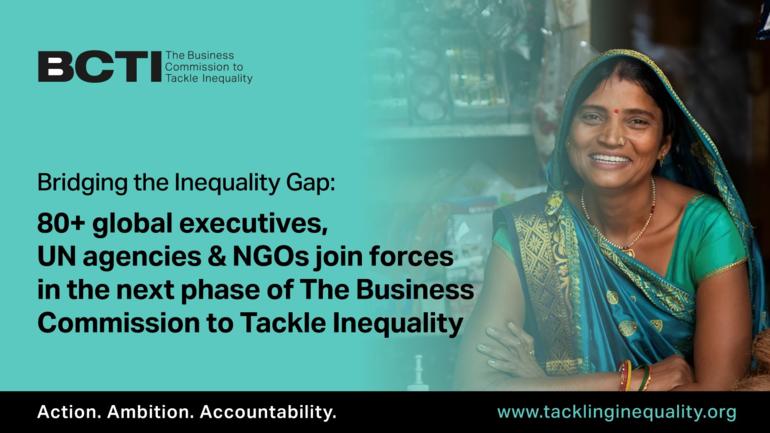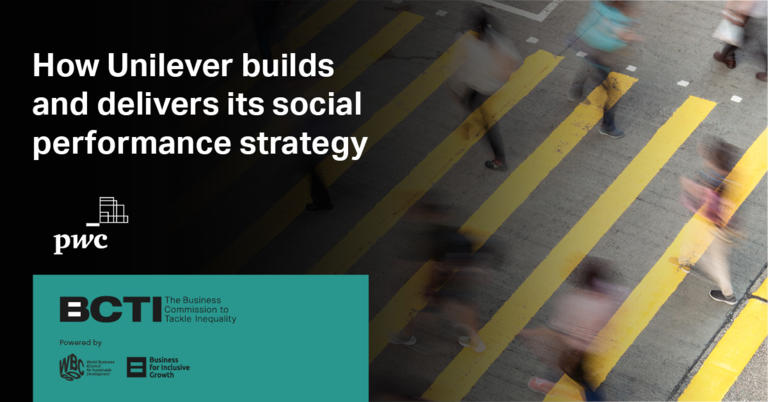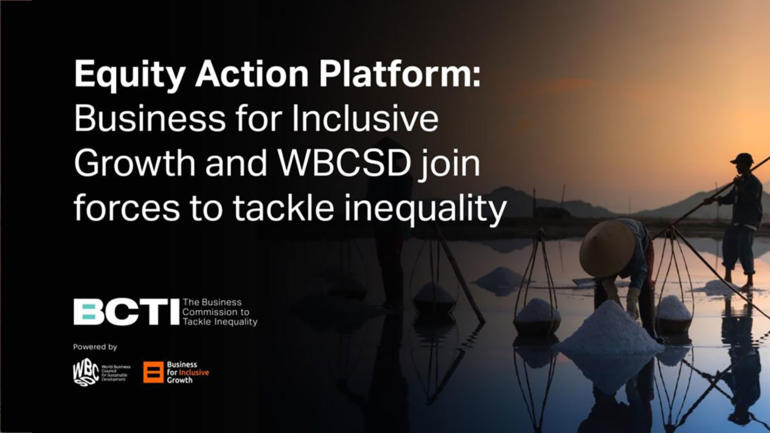As Bain’s inaugural chief diversity officer and global leader of our Diversity, Equity and Inclusion consulting practice, I am honored to have the opportunity to be a commissioner of the Business Commission to Tackle Inequality (BCTI), a multi-stakeholder coalition of organizations which puts addressing inequality at the heart of business’s agenda for sustainable growth.
Inequality is a systemic issue and the business community has unique capabilities to make an impact. The private sector can act as a change agent and drive change faster than governments and NGOs can do on their own. We’ve already seen the impact corporations can have to accelerate the needed transformation on broader ESG topics like carbon emissions and circularity. Now it’s time for businesses to commit similarly to creating more equitable outcomes in the workplace and their communities.
Corporations can make a direct impact on workforce representation of underrepresented groups because they have the jobs and career paths available if they work to improve access to those groups. However, achieving sustainable progress on diversity, equity and inclusion (DEI) inside an organization is challenging. Hiring employees from underrepresented groups is a critical first step, but ensuring that they develop, grow and thrive ultimately matters more. In our client work, we have seen a surge in interest for support in creating a more inclusive organizational system and a more equitable talent journey.
And mounting pressure from various stakeholders will continue to accelerate the corporate push in DEI across the globe based on recent research and reports. Specifically:
- Employees: Sixty-five percent of employees view an inclusive environment as “very important” when considering new roles.
- Investors: Sixty percent of surveyed private equity limited partners request DEI demographic data.
- Consumers: Two in three consumers across the UK, Germany, the US, China, and Brazil say companies and brands must demonstrate they are culturally aware and listening to the needs of their diverse customer base.
- Regulators: Multiple countries have recently enacted laws (or are considering doing so) that require companies to increase transparency in disclosing the diversity of their boards and the policies they have in place to improve their boards’ diversity.
Based on my experience helping to steward Bain’s ongoing progress on our DEI journey and overseeing our DEI consulting practice, I believe corporations can accelerate and amplify progress on DEI by doing five things:
- Set a holistic DEI strategy and ambition that spans both inside and outside the organization’s four walls. These include an equitable talent journey, an inclusive culture, fair wages and benefits and solid external engagement in the marketplace and the community. Several DEI strategies today focus solely inside a company’s four walls and don’t look at the broader marketplace and community outcomes.
- Publicly articulate goals—now. Multiyear results matter most, but continued progress requires specific goals with tangible metrics to inspire organizations and measure progress. Too many goals stop at broad aspirations to increase diverse representation without providing clear focus on specific populations or metrics for progress. In July 2022 we released our second annual DEI report, in which we shared our efforts to support our people, our business, and our community.
- Make multiyear results the responsibility of line leaders. DEI is an organizational mindset, not an HR program. In order to embed DEI in everyday behaviors, processes and business practices, line leaders need to feel accountable. The past few years have seen extraordinary growth in hiring chief diversity officers (CDOs) and expanding their teams, which is necessary to support real change. Yet it is business line leaders who ultimately make the hiring, deployment, and promotion decisions that result in diverse representation. Therefore, they need to take accountability for delivering sustainable results.
- Listen to all of your stakeholders and amplify marginalized voices. Studies have shown the enormous value of employee listening (for example, through employee engagement surveys). At Bain, we look at sentiment data through various demographic and intersectional cuts and share results with leaders across the firm. Your external stakeholders require the same level of attention. The marginalized groups you are working to better support must be a central part of any design team seeking to make a change, whether you’re redesigning a customer service process or creating a new marketing strategy.
- Make inclusion a reality. Inclusion is powerful—and universal. For companies to unlock the power of diverse teams, every individual must feel a strong sense of inclusion. What does “inclusion” mean? Our research found that people of all backgrounds describe inclusion quite similarly: the feeling of belonging in their organization, feeling treated with dignity as an individual and feeling encouraged to fully participate and bring their uniqueness to work every day. However, we also found that most people, regardless of background and tenure, do not feel fully included at work, so focusing on inclusion can often be the right place for organizations to jump-start their DEI journeys.
And we must be mindful that progress on DEI is a multiyear journey without a finite destination. I share with my teams and clients that DEI is different from other transformations: it is deeply personal, inherently subjective and it is difficult to know the end state. Making progress on DEI often requires going slow to go fast; taking the time to deeply understand the challenges, fully define the problems and recognize the highest-impact opportunities is critical. I’m encouraged by the progress I have seen across businesses, but I simultaneously acknowledge that meaningful change will take much more continued focus, effort and time.
BCTI will propose an action agenda for companies to address inequality and promote diversity, equity and inclusion in all organizations as a core element of this agenda. Business has a key role to play in providing equal work opportunities for all and building a work environment where everyone can thrive and feel trusted and respected. And we are deeply committed to this.








